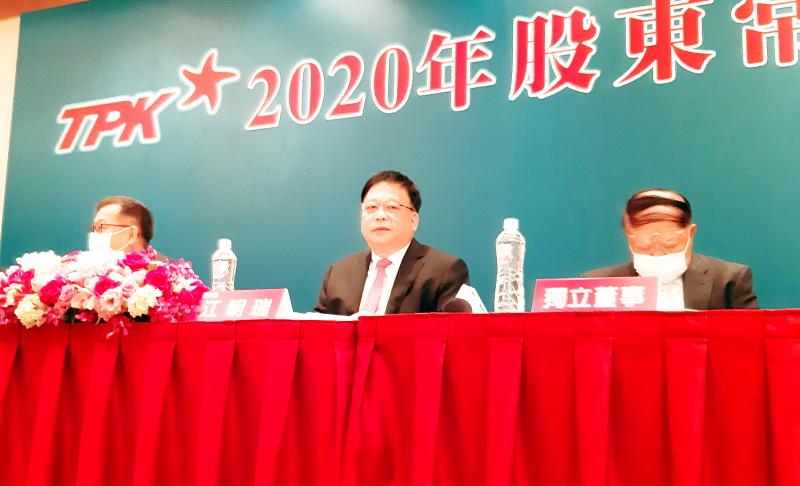Touch module and sensor supplier TPK Holding Co (宸鴻) yesterday gave a lukewarm outlook for the second half of this year, as the COVID-19 pandemic has upended the industry’s seasonal patterns.
Amid pandemic-related transportation restrictions and social distancing, online learning and remote working fueled demand for notebook computers and tablets in the first half, TPK chairman Michael Chiang (江朝瑞) told reporters after an annual shareholders’ meeting in Taipei.
“This was a big surprise for us, as we thought demand would have dipped [in the first half],” Chiang said. “I think there will be no explosive [revenue] growth in the second half, but a mild one.”

Photo: CNA
The company also saw robust demand for silver nanowire touch modules for 85-inch electronic whiteboards from schools, Chiang said, adding that TPK expects shipments of silver-nanowire touch modules used in large electronic whiteboards to grow 30 percent annually this year.
Like most of its peers, TPK usually sees revenue increase significantly in the second half of the year compared with the first half, as customers start restocking inventories ahead of annual product launches and year-end shopping sprees.
Over the past five years, TPK reported at least 30 percent more revenue in the July-to-December period than in the first six months of the year, company data showed.
“The second half of this year will be relatively flat,” Chiang said.
Average selling prices would continue to spiral down, Chiang said, adding that the company has tried to save costs to keep its business afloat
The company’s board of directors did not propose the distribution of a cash dividend, as it only eked out a profit of NT$209 million (US$7.03 million), or NT$0.51 a share, last year.
TPK had a gross margin of 3.5 percent and an operating margin of only 0.1 percent last year.
To improve its profitability, TPK yesterday said that it is diversifying from its core touch sensor and module business, and is looking for higher-margin businesses.
For the first time, TPK is attempting to build local manufacturing capacity in Taoyuan’s Gueishan District (龜山) to make insoles for athletic footwear and protective gear for sports using 3D printing technology, Chiang said.
The company is also working on two new projects with customers in the information technology sector, he said, without disclosing the names of its two partners.

South Korea’s equity benchmark yesterday crossed a new milestone just a month after surpassing the once-unthinkable 5,000 mark as surging global memory demand powers the country’s biggest chipmakers. The KOSPI advanced as much as 2.6 percent to a record 6,123, with Samsung Electronics Co and SK Hynix Inc each gaining more than 2 percent. With the benchmark now up 45 percent this year, South Korea’s stock market capitalization has also moved past France’s, following last month’s overtaking of Germany’s. Long overlooked by foreign funds, despite being undervalued, South Korean stocks have now emerged as clear winners in the global market. The so-called “artificial intelligence

NEW IDENTITY: Known for its software, India has expanded into hardware, with its semiconductor industry growing from US$38bn in 2023 to US$45bn to US$50bn India on Saturday inaugurated its first semiconductor assembly and test facility, a milestone in the government’s push to reduce dependence on foreign chipmakers and stake a claim in a sector dominated by China. Indian Prime Minister Narendra Modi opened US firm Micron Technology Inc’s semiconductor assembly, test and packaging unit in his home state of Gujarat, hailing the “dawn of a new era” for India’s technology ambitions. “When young Indians look back in the future, they will see this decade as the turning point in our tech future,” Modi told the event, which was broadcast on his YouTube channel. The plant would convert

‘SEISMIC SHIFT’: The researcher forecast there would be about 1.1 billion mobile shipments this year, down from 1.26 billion the prior year and erasing years of gains The global smartphone market is expected to contract 12.9 percent this year due to the unprecedented memorychip shortage, marking “a crisis like no other,” researcher International Data Corp (IDC) said. The new forecast, a dramatic revision down from earlier estimates, gives the latest accounting of the ongoing memory crunch that is affecting every corner of the electronics industry. The demand for advanced memory to power artificial intelligence (AI) tasks has drained global supply until well into next year and jeopardizes the business model of many smartphone makers. IDC forecast about 1.1 billion mobile shipments this year, down from 1.26 billion the prior

People stand in a Pokemon store in Tokyo on Thursday. One of the world highest-grossing franchises is celebrated its 30th anniversary yesterday.